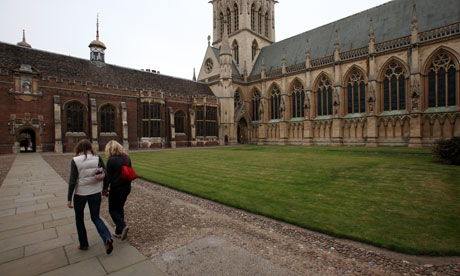Exeter has become the first university outside the Russell Group to announce that it will charge the maximum £9,000 fee for a degree from next year, saying it will need the extra income to meet higher expectations from students.
Exeter, which follows Cambridge and Imperial College London in confirming plans to treble fees, also said it would offer fee waivers or bursaries for students from less well-off backgrounds. Ministers have said the maximum fee should only apply in "exceptional circumstances".
David Allen, Exeter's registrar and deputy chief executive, said: "By setting our fees at the £9,000 level we are able to continue to invest in the student experience, and spend a lot more money to bring in more people from less well-off backgrounds.
"We are talking about having more academic staff, improving the staff-student ratio, more contact hours. What we're doing is to try and give the best possible experience to our students."
Exeter is a member of the 1994 group of smaller research-intensive universities, which includes East Anglia, York and Leicester. Its decision will increase pressure on similar universities to opt for maximum fees to maintain their prestige. Some universities in this group are looking at whether to charge varying fees for different degrees.
Exeter, which follows Cambridge and Imperial College London in confirming plans to treble fees, also said it would offer fee waivers or bursaries for students from less well-off backgrounds. Ministers have said the maximum fee should only apply in "exceptional circumstances".
David Allen, Exeter's registrar and deputy chief executive, said: "By setting our fees at the £9,000 level we are able to continue to invest in the student experience, and spend a lot more money to bring in more people from less well-off backgrounds.
"We are talking about having more academic staff, improving the staff-student ratio, more contact hours. What we're doing is to try and give the best possible experience to our students."
Exeter is a member of the 1994 group of smaller research-intensive universities, which includes East Anglia, York and Leicester. Its decision will increase pressure on similar universities to opt for maximum fees to maintain their prestige. Some universities in this group are looking at whether to charge varying fees for different degrees.
Universities minister David Willetts said that institutions would only need to charge £6,000 to cover the costs of arts and humanities students, whose courses are cheaper than science or medicine.
He said: "The maximum allowable charge of £9,000 in 2012/13 would actually represent an increase for them of over 40% even after inflation, as against an increase of 20% or so for the other disciplines."
He said: "The maximum allowable charge of £9,000 in 2012/13 would actually represent an increase for them of over 40% even after inflation, as against an increase of 20% or so for the other disciplines."
But Exeter said it would have to raise fees simply to maintain the same quality of teaching. Allen said: "Our own calculations show that we would need a fee of at least £7,000 just to stand still.
"I think you have to bear in mind there will be much higher student expectations, they will expect to see more staff, have better facilities, as more of the onus on paying for their education is coming on to them after graduating."
When fee waivers are taken into account, the average tuition fee would be less than £9,000, the university said. The fee announcement does not cover the Peninsula College of Medicine and Dentistry, which is a partnership between Exeter and Plymouth Universities.
The college lecturers' union, the UCU, said that the average fee needed to replace government funding cuts would be £6,863 for universities offering arts and humanities courses to break even. Sally Hunt, the UCU's general secretary, said: "Our own research shows to replace the money he [the government] has cut, the average fee needs to be almost £7,000. The government urgently needs to look again at the severity of its university funding cuts."
Universities could face a change in the law to stop some of them from charging students £9,000 a year if too many institutions are "clustering their charges at the upper end", the government warned last month.
• This article was amended on 2 March 2011. An editing error inserted references to Exeter as outside the top 20 in the Russell Group. This has been corrected.
Source: http://www.guardian.co.uk/education/2011/mar/02/exeter-university-to-charge-top-fees
"I think you have to bear in mind there will be much higher student expectations, they will expect to see more staff, have better facilities, as more of the onus on paying for their education is coming on to them after graduating."
When fee waivers are taken into account, the average tuition fee would be less than £9,000, the university said. The fee announcement does not cover the Peninsula College of Medicine and Dentistry, which is a partnership between Exeter and Plymouth Universities.
The college lecturers' union, the UCU, said that the average fee needed to replace government funding cuts would be £6,863 for universities offering arts and humanities courses to break even. Sally Hunt, the UCU's general secretary, said: "Our own research shows to replace the money he [the government] has cut, the average fee needs to be almost £7,000. The government urgently needs to look again at the severity of its university funding cuts."
Universities could face a change in the law to stop some of them from charging students £9,000 a year if too many institutions are "clustering their charges at the upper end", the government warned last month.
• This article was amended on 2 March 2011. An editing error inserted references to Exeter as outside the top 20 in the Russell Group. This has been corrected.
Source: http://www.guardian.co.uk/education/2011/mar/02/exeter-university-to-charge-top-fees

